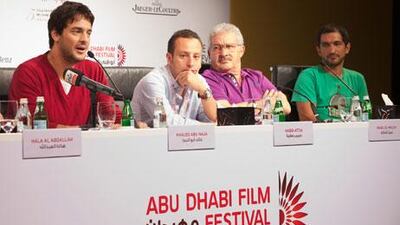The impact of the Arab Spring on filmmaking has been the subject of a fiery and emotional discussion at the Abu Dhabi Film Festival.
A hotly anticipated forum on the topic, in a full auditorium at the Fairmont Bab Al Bahr on Monday afternoon, brought together a panel of cinematic representatives from Egypt, Tunisia and Syria struggling to keep their collective thoughts within the set scheduling.
In pictures:Fashion on the red carpet at ADFF 2011
Glamour and fashion on the red carpet at ADFF 2011.
Video:The Ides of March trailer - ADFF 2011
George Clooney and Ryan Gosling star in this political feature.
The view from Syria, where president Bashar Al Assad continues violently to put down pro-democracy uprisings that began in January, was one of hope. "Extreme censorship, extreme corruption and extreme red tape has been killing creativity," said the Syrian filmmaker Hala Al Abdallah in an emotional speech. "There is great capacity for filmmaking, but because of the corruption, producers have only been able to produce two to three movies in their lifetimes." The revolution, she thought, would have a radical impact on filmmaking.
In Tunisia - where Zine El Abidine Ben Ali was deposed in January this year - there had been concerted efforts to separate cinema from government and politics, where it had been intrinsically linked before.
"We now have a new cinema academy, which was formalised a few weeks ago," said Habib Attia, the Tunisian film and TV producer.
This academy, he claimed, was managed by filmmakers independent of government and was allowed to accept private financing.
Although there have been efforts to pull away from the level of censorship Tunisian cinema had been thwarted by before, "this won't happen overnight", said Attia.
Censorship is still a hot topic, with a television screening of Marjane Satrapi's 2007 film Persepolis last week causing violent demonstrations from radical Islamists in Tunis.
A view that echoed throughout the session was that with the Arab Spring still very much far from over, it was too early to say what would happen with cinema, which across most countries affected by recent revolution had for decades been stifled by government control or excessive bureaucracy.
"The Arab Spring's effect on cinema can't be assessed right now," said Attia. "We can't tell if there is a direct impact."
Two of the films showing at this year's film festival - 18 Days and Tahrir 2011: The Good, the Bad and the Politician - have come directly from the Egyptian revolution. A collection of shorts by different Egyptian directors, 18 Days was screened at the Abu Dhabi Theatre last night and will be shown there again tomorrow at 2.45pm.
The film premiered at the Cannes Film Festival just three months after the fall of Hosni Mubarak. But it caused controversy at the time, when it emerged that two of the filmmakers - Marwan Hamed and Sherif Arafa - were believed to have had links to the deposed dictator. Egyptian actor, producer and director Amr Waked, who spearheaded a boycott of the Cannes event at the time, was also on the Abu Dhabi panel discussion.
"Those who supported the regime have no right to be the first to make a film about the revolution," said Waked. "There needs to be accountability." Waked, who starred in Syriana and Contagion, which is playing at the festival, was recently named among VarietyArabia's "Five Arab Producers to Watch".
Waked suggested that the regional uprisings could help introduce the relatively new concept of "crowdfunding" for filmmakers, which involves sourcing money from thousands of individual donors rather than one or two big production houses.
"There are more than 300 million Arabs who can help fund a film this way," he said. "And with it we can stop censorship."
Although the Arab Spring appears far from reaching its conclusion, and with it the sweeping changes that it might bring to the region's cinema industry, there was one positive, overriding feeling across the panel: that the new sense of freedom had opened up creativity.
"The Arab Spring has pushed freedom of expression," said Waked. "Without the Arab Spring we wouldn't have had the courage to produce indie films with big budgets."
One of Waked's latest projects is R for Revolution, a drama set during the Egyptian revolution and due for release next year.
"We're seeing scripts, music and writing emerge from this feeling of freedom," said Al Abdallah. "There are now young people who have more openness - it was if there was a desert and you sporadically find flowers blossoming. And the seeds will be ready to be harvested soon."
And although her passionate talk about the current situation in Syria described people shot dead simply for recording the violence on their phones, Al Abdallah said the ongoing struggle had reinvigorated her soul. "This revolution has brought me my youth back. Because of this, I will have a longer span of life."

